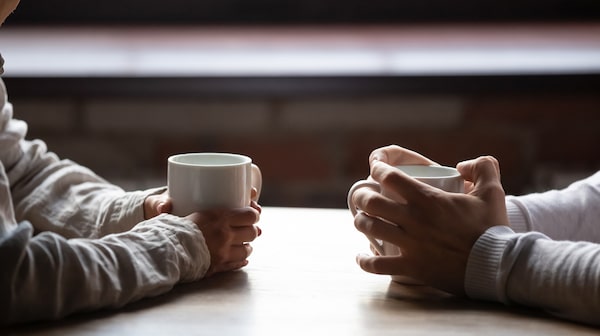
The best way to break out of a conversational rut is to check your ego at the door and celebrate the simplest of things, says John Eastwood, co-author of Out of My Skull: The Psychology of Boredom.fizkes/iStockPhoto / Getty Images
It’s difficult to be a dazzling conversationalist when you’ve been staring at the same four walls for months on end. A typical COVID-era conversation, for example, might go something like this: “So what’s new?” Followed by the inevitable, “Nothing much.” Then, an awkward pause.
The pandemic has curtailed most activities, cancelled social gatherings and even made the simple act of carrying on a two-way dialogue a challenge. With relatively little to do, it often feels like there’s relatively little to say.
John Eastwood, a clinical psychologist with Toronto’s York University, says the key to making conversations lively once again is to embrace the mundane and celebrate the everyday. “Andy Warhol put is eloquently many years ago when he said, ‘You need to let the little things that bore you suddenly thrill you,’” he says. In a decidedly un-boring chat with The Globe and Mail, Eastwood, co-author of Out of My Skull: The Psychology of Boredom, says the best way to break out of a conversational rut is to check your ego at the door, embrace the ordinary and celebrate the simplest of things.
That sounds wonderful but times are pretty bleak, isn’t being thrilled by the boring things easier said than done?
Perhaps, but we have to recognize that mundane activities are not a waste of time. Nor should all activities inflate our sense of being special – that is often a hidden, inappropriate motivation for engaging in activity. We have to check our biases for things that are new-and-improved and novel; and instead recognize the value in what’s already at hand.
How do we put that into action?
Often in our conversations we feel that we have to talk about the special, salient or extraordinary moment in our lives, things like the award one of our kids might have just received, or a promotion we got at work. That thinking sets up a certain implicit frame of how conversations should go, what they should be all about. We have to flip that on its head and begin at a different starting point. There is value in doing nothing. You can daydream and use your imagination. You can share those aspirations and thoughts with your family and friends. It doesn’t always have to be about accomplishments and actions. Doing nothing can actually be very good for you.
What is the distinction between doing nothing and being bored?
To me, “doing nothing” means a lack of constraint or pressure. There are no external forces placing demands on how we spend our time which means we have the opportunity to be fully present with what is happening. It means being time rich. Being bored, on the other hand, means having an unfulfilled desire to be engaged in satisfying activity. It is associated with the feeling that time is dragging. Bored people are restless and looking for something they can’t find. It is very possible, and arguably desirable, to be “doing nothing” but not be bored. The prime example of this would be looking out the window and getting lost in daydreams, which can have great value.
How do we make the mundane and everyday seem worthwhile and interesting?
Check our ego and give close attention to mundane activities. Choosing to attend to something is what gives it value and interest.
Why do we see doing nothing as a failure?
I think our society is preoccupied with productivity, efficiency and the utility of things. There is a concept in psychology called idleness aversion. Our society commodifies time and people so everything of value is determined in terms of its utility. Time is money so I have to spend it wisely. In our pre-pandemic life, our alarm woke us at 7 a.m. and everything was preordained for us by the regular routines of our day. Now the structures and routines are gone and we’re not so good at authoring our own lives, being autonomous and self-directed.
So, doing nothing gives us an opportunity to rediscover ourselves?
It gives us a chance to figure out what we’re good at, what brings us joy, what makes us sad or bores us to tears. If we use our enforced down time for some careful self-discovery there is suddenly a wellspring of things we can share with our friends. Pre-pandemic, we were on autopilot. So luxuriate in daydreaming and mind-wandering because it can be a wellspring of creativity. Share with the people you are close to, what is going on in your inner life.
How do we draw out people to have meaningful conversations with us?
Be more empathetic. Become an active listener. A colleague of mine does couples’ [therapy] work, and he talks about listening to understand versus listening to respond. Ask questions that speak to what is really going on in your friend or family members’ life. Don’t just ask them what’s new? Ask them how they’re feeling. Scratch below the surface. We have time to do that now.
Sign up for the weekly Parenting & Relationships newsletter for news and advice to help you be a better parent, partner, friend, family member or colleague.
 Gayle MacDonald
Gayle MacDonald